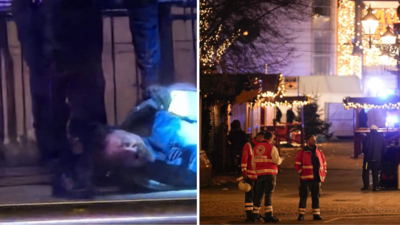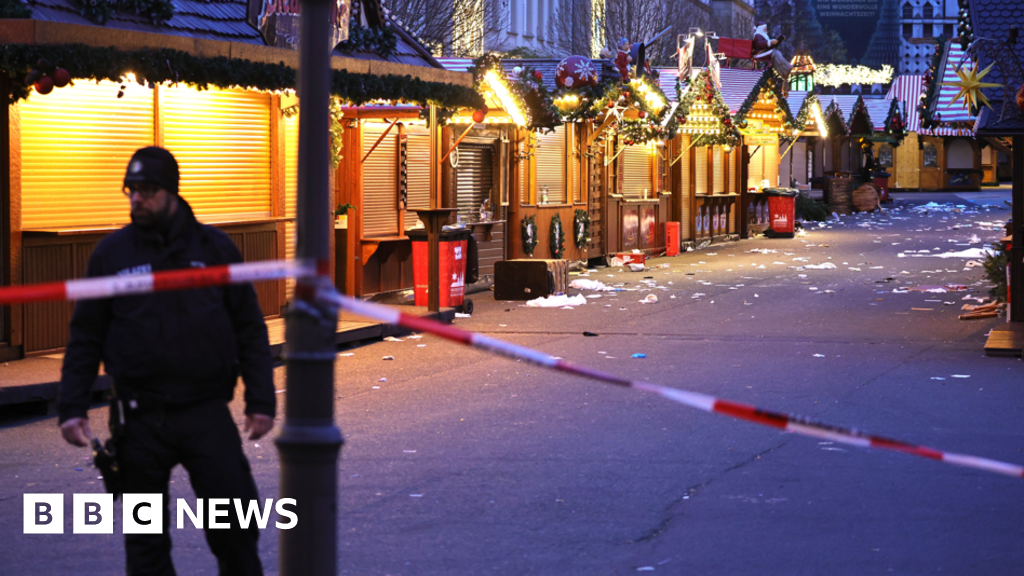
Taleb (left) and emergency services work near a Christmas market following the car crash incident in Magdeburg (Photo credit: X/AP).
The driver of the car that plowed into a Christmas market crowd in
Magdeburg
, Germany, on Friday, killing at least two people, including a child, has been identified as Taleb. The city government reported at least 68 injuries, with 15 people in critical condition. The driver was arrested immediately.
Who is Taleb?
Taleb A., a 50-year-old Saudi Arabian medical doctor, is a consultant in psychiatry and psychotherapy, according to a report by The Guardian. Taleb had been living in Germany since 2006 and was granted refugee status in 2016.
Footage from the scene showed the suspect lying on the ground near a heavily damaged black car, with a police officer pointing a weapon at him while bystanders looked on in shock.
Saxony-Anhalt's leader, Reiner Haseloff, who was en route to Magdeburg, stated, “As things stand, he is a lone perpetrator, so as far as we know, there is no further danger to the city.”
The Guardian report, citing a security source, revealed that the suspect had rented the car shortly before the attack and had no known Islamist ties.
A witness told the Mitteldeutsche Zeitung that the attacker had “driven deliberately into the section of the Christmas market decked out with scenes from fairytales,” an area crowded with families and children. She described narrowly escaping with her child by throwing themselves out of the vehicle's path.
Car crash
A car crashed into a Christmas market crowd in Magdeburg, Germany, on Friday, killing at least two people, including a child. The city government reported 68 injuries, with 15 people in critical condition. Local officials are describing the incident as a terror attack. Eyewitnesses told broadcasters that a black BMW drove into the crowd toward the town hall, traveling at high speed for 400 meters.
Videos circulating on social media, yet to be officially verified, appear to show a dark car speeding into the crowd.
Emergency personnel treated the injured at the scene. Witnesses described hearing cries and screams, with one food stall operator comparing the aftermath to a "war zone."
Saxony-Anhalt's leader, Reiner Haseloff, traveling to Magdeburg, stated, “This is a terrible event, particularly now in the days before Christmas.”
What eyewitnesses say
One eyewitness, 32-year-old Nadine, told Bild newspaper that she was holding her boyfriend when the black car struck. "He was hit and pulled away from my side. It was terrible," she said, as quoted by the BBC. Her boyfriend reportedly suffered leg and head injuries.
The vehicle continued driving for hundreds of meters after the initial impact, according to video footage circulating in German media.
MDR reporter Lars Frohmüller, who arrived at the scene shortly after the attack, described a chaotic situation. "Everywhere there were ambulances, police, and many firefighters," Frohmüller told the BBC. "This was a real chaotic situation. We saw blood on the floor, people sitting beside each other with golden and silver foils around them, and many doctors trying to keep people warm and help with their injuries. It's a big shock for everyone here in Magdeburg and across Saxony-Anhalt."
Earlier attacks
Germany has faced attacks on Christmas markets before. In 2016, an Islamist extremist drove a lorry into a Berlin market, killing 12 people.
Last month, German Interior Minister Nancy Faeser emphasized the need for "greater vigilance" at Christmas markets. Despite this, she stated that there were no "concrete" indications of danger at the time. Following a knife attack in Solingen in August that killed three people, Faeser also highlighted the need for stricter weapons laws in public areas.
In connection with the Solingen attack, a 26-year-old Syrian man was arrested on suspicion of being a member of the Islamic State group. This incident reignited discussions surrounding asylum and migration policies in Germany.

 1 day ago
3
1 day ago
3










 English (US) ·
English (US) ·